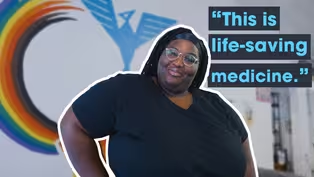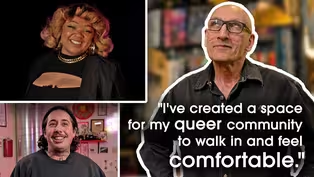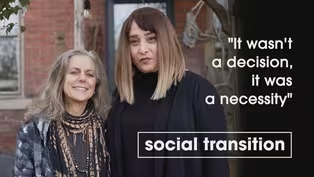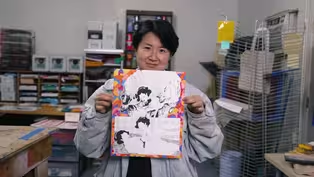
Authentic Lives: How Performance Shapes Identity
6/26/2024 | 10m 11sVideo has Closed Captions
LGBTQIA+ community members have had a long history of involvement in arts and entertainment.
LGBTQIA+ community members have had a long history of involvement in arts and entertainment. In this episode of Authentic Lives, we'll meet a comedian, a dancer, and a musician who use performance as a form of expression and self discovery.
Problems playing video? | Closed Captioning Feedback
Problems playing video? | Closed Captioning Feedback
More Local Stories is a local public television program presented by WQED

Authentic Lives: How Performance Shapes Identity
6/26/2024 | 10m 11sVideo has Closed Captions
LGBTQIA+ community members have had a long history of involvement in arts and entertainment. In this episode of Authentic Lives, we'll meet a comedian, a dancer, and a musician who use performance as a form of expression and self discovery.
Problems playing video? | Closed Captioning Feedback
How to Watch More Local Stories
More Local Stories is available to stream on pbs.org and the free PBS App, available on iPhone, Apple TV, Android TV, Android smartphones, Amazon Fire TV, Amazon Fire Tablet, Roku, Samsung Smart TV, and Vizio.
Providing Support for PBS.org
Learn Moreabout PBS online sponsorshipMore from This Collection
The human experience, diversity, equity, and inclusion is at the heart of each episode, with a focus on the people and organizations making an impact. The ongoing series features those whose work, careers, or everyday lives are leading to positive changes in the LGBTQIA+ community.
Authentic Lives: Community Care
Video has Closed Captions
Hear from the LGBTQIA+ community about healthcare access challenges and the Pittsburgh organizations (8m 36s)
Authentic Lives: Business and Community
Video has Closed Captions
LGBTQ+ owned businesses provide safe havens, while also developing community and culture. (7m 48s)
Authentic Lives: Social Transition
Video has Closed Captions
For much of the transgender community, first steps in transitioning are relatively small. (8m 21s)
Authentic Lives: Art, Expression, and Identity
Video has Closed Captions
Art is often an expression of one’s true self, a medium utilized by many queer individuals (7m 20s)
Providing Support for PBS.org
Learn Moreabout PBS online sponsorship- This program was made possible with major funding from Central Outreach Wellness Center.
- I personally really struggle with my bathroom experiences as a trans masc individual.
For every gender neutral bathroom there is at least three Salvation Army buckets available, which gives me an awful, wonderful idea.
My name is Asher O' Briant.
My pronouns are he and they, and I am a comedy writer, but I perform in a lot of mediums.
I like to write.
I like to direct.
I even perform in drag.
I'm a transgender comedian, so I do think that I have a unique perspective on certain issues where I can talk about my experiences as both genders.
Comedy is a great way to express taboo subjects in a way that is warm and inviting.
It's been a great way for me to talk about my identity and my personal experiences, even if they were hard and being able to look back on them and laugh.
I got my first period during roller derby practice.
Yeah.
Performance is something that can extend from the stage to our lives, especially with queer people early in coming out, we have a hard time presenting as we'd like.
We present as we want the world to see us, sometimes.
For myself, when I first came out, I would present almost overly masculine because I wanted everyone to know.
A lot of my friends and family will ask me why I switched teams, and to that I say, dude, can't you tell they're winning?
I always have to remind myself that I'm performing for my own values and my own ideas, and the audience is there to listen to those and receive them, and they don't have to take those to heart.
And that ultimately isn't something in your control.
As a performer, what I do get to control is my own writing, my own words and my own personality when I'm on stage.
So if they don't want to take the lessons that I'm teaching to heart, that is up to them, it's, you know, their prerogative.
They're paying money, but I'd like to give them the opportunity to get to know me in my own sphere.
- My name is Simon Phillips.
I'm a dancer, performer, teaching artist, behavior technician and fitness coach.
Honestly, I've been dancing for as long as I can remember.
I just was the kid that wanted to run around and play tag and make trouble.
And I had a guidance counselor in a high school that saw me as a beautiful dancer and said, you should pursue dance as a career.
And I was like, they don't make money.
I don't think I want that.
But I knew I had a, a knack for, for helping people and also had a strong interest in in studying the mind.
So I pursued psychology.
So I do a lot of working with, now, the special needs community and also youth on the spectrum, and I like to incorporate art within that because it does provide many entry points into all the socio- emotional, behavioral skills that one needs to navigate life.
Dance offers an avenue to embody fluidity in many different versions of yourself.
I contracted HIV in 2017.
I was 23 years old.
I was still learning myself.
There's the stigma behind having HIV and being black and being non heterosexual, but I am black, I am gay, I'm all those things.
That is something that I've learned through movement and dance and artistry to be flexible and fluid and express all the many manifestations of who I am and who I can be.
There's so much in dance that can be prescribed not only physically, but cognitively, emotionally, mentally, spiritually.
One of my big shtick is spending more time dancing with people instead of dancing for people.
I wanna make sure that it is accessible and feels accessible to any person that is witnessing it or experiencing it.
I love to look an audience member in the eyes and say, you can do this too.
- My name is Donny Donovan and I am a songwriter in the band Levi.
I'm also the lead singer and a guitar player, and I also own a gym called Free Will Health and Wellness.
The music that I'm always writing tends to be emotional, like emo.
It either becomes like emo indie or emo pop and there's like an emo grunge.
It's kind of always a little emo.
So I found basically my band by just telling people I play guitar and wrote songs.
At that point, that band was called Roulette Waves and I played in another project called Hearken.
At that point in my life, I didn't want to identify as a woman, but like that's how I presented.
I mean, I always knew that I was trans.
I mean, I literally would dream, like go to bed and like just hope that I would wake up in the body the next day that I thought I was.
I decided to go on HRT and for me it was testosterone, and what that does is lower your vocal register.
I ran into issues where, in Hearken, I could no longer really sing the parts that were on the record, and that really was challenging to produce a note that is sitting in my throat in a different way.
It was almost like I just wanna start over and maybe this is what this is telling me.
This is like the first project I'm kind of coming to myself and playing music that's just not really for anybody else.
Part of it is dealing with a lot of your own internal transphobic stuff.
How are people going to see me?
And if they don't see me as how I see me, how do they see me?
- Kelly Strayhorn Theater is a performing arts organization, a presenting institution, and also a space where folks can come and rent our facilities and our staff will work with you to really bring your vision to life on stage.
Our mission is to be a home for creative experimentation rooted in the liberation of black and queer people.
Our role is to really be a partner with the artists.
They're often able to be in our space with technical support, lighting, sound projection, you know, all of these tools that a lot of performing artists need.
Often we don't realize how artists are entrepreneurs.
We are there with them to bring some ease to that, Some of the artists that we're working with that I'm super excited about, one Adil Mansoor, a queer, Pakistani-American based in Pittsburgh.
He's doing incredible work in really pushing the form of theater.
Slow Danger is a dance duo who uses a lot of technology in their work.
We always work with Stacy Pearl Dance Project and Soy Sos.
Stacy is really touring the world talking about black girl magic.
What I always tell folks is that we are not a culturally specific organization.
Who you will see on stage is not just black or queer folks.
We have many different types of artists that we present that we work with.
We have many different types of audiences that we welcome into our doors, but really what we say is that everyone must subscribe to that mission, must show up, believing that we are all here to celebrate each other and to help each other become liberated, become free.
There have been so many amazing artists coming from Pittsburgh.
You know, we can talk about Andy Warhol, Billy Strayhorn, and Gene Kelly, and I believe that those artists are here right now too.
There's an opportunity to say yes, like right now, we have amazing people who have something to say about the world right here in Pittsburgh.
That gets me really excited.
- It's inspiring for people to be themselves always and to write about their experiences and their love life or intimacy that people should know about and listen to and it not be considered explicit or something like that.
- It's important to be vocal and advocate for other underrepresented comics, having more voices with different backgrounds and stories always enriches comedy.
Support local art, and you do not have to wait until June to support local queer art.
- I'll always be an artist, I'll always be moving, I'll always find some way to incorporate dance and artistry in my life.
Performance can mean many things outside of sitting in a chair and, and just watching and, and and enjoying a show performance, I think is the way that we live our lives in the way that we decide to move through the day.
- This program was made possible with major funding from Central Outreach Wellness Center.
Support for PBS provided by:
More Local Stories is a local public television program presented by WQED

















